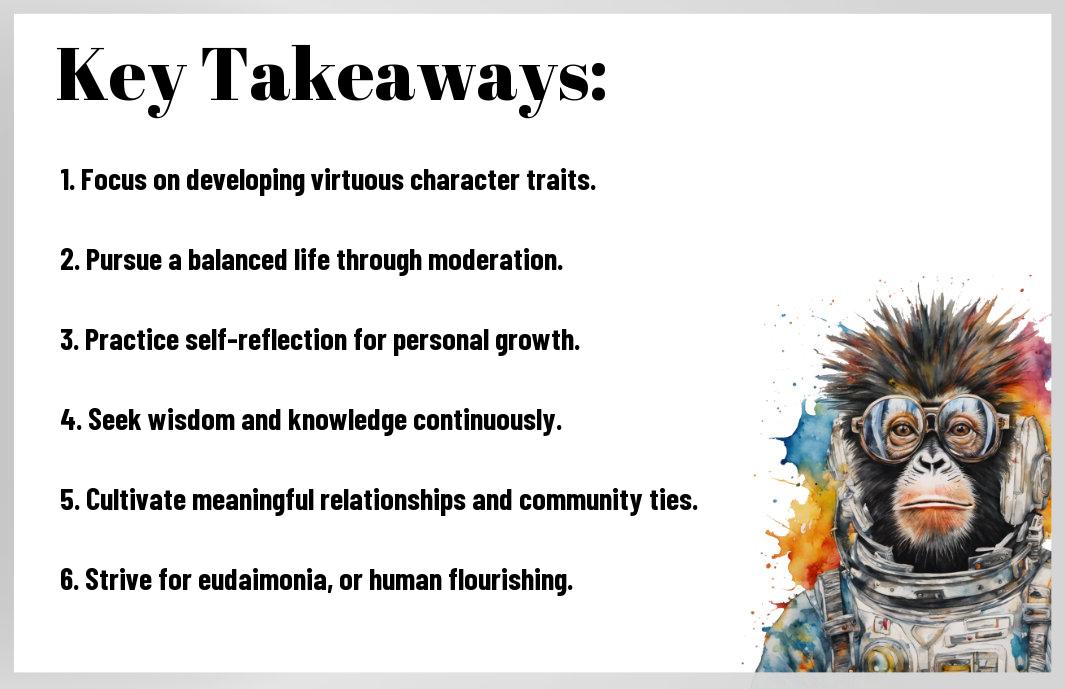There’s something incredibly inspiring about the teachings of Aristotle when it comes to self-improvement. As I explore the timeless ideas of this ancient philosopher, I realize how they can guide us in our personal growth journeys today. By embracing his concepts of virtue, reason, and balance, I believe you and I can cultivate a more fulfilled and meaningful life. Join me as I examine into practical applications of Aristotle’s wisdom that can help us enhance our daily existence and become the best versions of ourselves.
Key Takeaways:
- Virtue Ethics: Aristotle emphasizes the importance of developing personal virtues as a foundation for self-improvement.
- Golden Mean: Strive for balance in life; find the midpoint between extremes in behavior and emotions.
- Telos: Understand your ultimate purpose or goal in life; aligning actions with this purpose fosters genuine growth.
- Practical Wisdom: Cultivate practical wisdom (phronesis) to make better decisions and navigate life’s challenges effectively.
- Habit Formation: Prioritize the practice of good habits; consistent practice is necessary for character development.
- Community Role: Engage with a community to support your growth, as relationships play a key role in achieving personal excellence.
- Lifelong Learning: Embrace a mindset of continuous learning and adaptation for sustained self-improvement.

Understanding Aristotle’s Philosophy
While plunging into Aristotle’s philosophy, I find it incredibly enriching and applicable to our modern journey of self-improvement. His reflections on ethics, virtue, and the nature of happiness provide a roadmap that can guide us in our quest for a fulfilling life. By adopting his ideas, you might unlock new pathways to personal growth and develop a deeper understanding of what it means to lead a virtuous life. Aristotle emphasizes the importance of rational thought and the pursuit of the good life, which resonates with me as I navigate my own challenges and aspirations.
The Concept of Virtue
Philosophy, according to Aristotle, is not just a collection of abstract ideas but a practical guide to living well. At the heart of his ethical framework lies the concept of virtue, which he describes as a habit that allows us to achieve our highest potential. Virtue is about finding balance and moderation; it’s the golden mean between excess and deficiency. For instance, courage is a virtue that exists between the extremes of recklessness and cowardice. When I reflect on this, I recognize that cultivating virtues requires active engagement and a commitment to self-improvement.
The Importance of Habituation
Before we can embody these virtues, Aristotle insists on the significance of habituation, a process that involves consistent practice and reinforcement of good behaviors. It’s through this repetitive action that virtues become second nature. I believe that determining to engage in habits that reflect qualities such as honesty, kindness, and temperance can gradually shape who we are. It’s not enough to simply aspire to be virtuous; we must embody these qualities in our everyday lives to make meaningful changes.
Indeed, habituation is not just an exercise in willpower; it’s about creating an environment that nurtures our personal growth. By making conscious choices to practice specific virtues daily, we begin to cultivate a mindset rooted in positivity and resilience. I often think of it as planting seeds in a garden; with time, care, and dedication, those seeds can blossom into flourishing habits that define my character. The more I commit to these practices, the more naturally they integrate into my life, guiding me toward a more virtuous existence.
The Role of Practical Wisdom
Making Better Choices
Below, I want to highlight how practical wisdom can transform the way we make decisions in our daily lives. When faced with various choices, practical wisdom encourages me to not only consider the consequences but also to draw from my experiences and understanding of myself and the world around me. It’s about striking a balance between rational analysis and emotional insight. Often, I find that when I take the time to reflect on my values and the context of my situation, I am better equipped to make more meaningful choices that lead to personal growth and fulfillment.
Navigating Moral Dilemmas
At times, we all encounter situations that challenge our moral compass. By exercising practical wisdom, I can face these dilemmas with a clearer understanding of the implications of my actions. It’s about looking beyond the immediate outcomes and considering the broader impact my choices may have on myself and others. This nuanced approach allows me to weigh my options and appreciate the complex nature of morality, guiding me toward a decision that aligns with my values while also fostering empathy and compassion.
Consequently, it’s important to acknowledge that navigating moral dilemmas is often a process of trial and error. You might find yourself oscillating between different perspectives, trying to determine what feels right. By practicing practical wisdom, I encourage myself to embrace the uncertainty that comes with these decisions. It’s okay to learn as I go and adjust my approach based on the insights I gain. Ultimately, this journey of self-discovery and reflection helps me develop a deeper understanding of my own ethical framework over time.
Developing Personal Character
After stepping into the essence of self-improvement through an Aristotelian lens, I find that developing personal character is foundational to becoming my best self. Aristotle emphasized that the virtues one embodies are imperative for living a flourishing life, known as eudaimonia. This involves cultivating moral and intellectual virtues that guide my actions and decisions. By focusing on personal character, I learn to align my behavior with my values, ultimately leading to a more meaningful existence.
The Four Cardinal Virtues
Among the various virtues Aristotle discussed, the Four Cardinal Virtues stand out as imperative pillars for ethical living: prudence, justice, fortitude, and temperance. Each virtue plays a significant role in shaping my character and guiding my everyday choices. By practicing prudence, I learn to make wise decisions; justice urges me to consider the rights of others; fortitude empowers me to face challenges bravely; and temperance teaches me the importance of moderation in all aspects of life.
Cultivating Good Habits
Below the surface of these virtues lies the necessity of cultivating good habits. It’s all about consistency and commitment to the practices that embody these virtues in my daily life. As I reflect on my behaviors, I understand that habits form the foundation of my character; they can either reinforce my virtues or lead me astray. Ultimately, the smaller actions I take over time can set the stage for a more virtuous and fulfilling life.
A practical approach I find effective in cultivating good habits is the concept of building a routine that aligns with the Four Cardinal Virtues. I begin by identifying small, manageable steps that represent each virtue—I might set aside time each day for reflection (prudence), engage in acts of kindness (justice), push myself to tackle challenges (fortitude), and practice moderation in my daily choices (temperance). By committing to these actions consistently, I gradually form stronger habits that enhance my character and lead me toward the life I aspire to live.
The Balance of Life
Keep in mind that the journey towards self-improvement is not about aiming for perfection, but rather about finding that sweet spot where all aspects of our lives can coexist harmoniously. This balance, as Aristotle suggests, is fundamental to achieving true happiness and fulfillment. It means considering the various elements of our existence—work, relationships, health, and leisure—and ensuring none are neglected in pursuit of another. It’s a gentle art of juggling, where each ball deserves attention, and neglecting one can cause the others to falter.
The Doctrine of the Mean
By embracing Aristotle’s Doctrine of the Mean, I learn to navigate the extremes of excess and deficiency that can disrupt my balance. This ancient philosophy teaches me that virtue lies in moderation; that for every trait or pursuit, there exists an ideal mean. For example, in my quest for friendship, I must avoid being overly accommodating while also steering clear of aloofness. By recognizing these spectrums, I can better cultivate genuine connections that enrich my life.
Finding Harmony in Life
Finding harmony in life often feels like a perpetual quest, but it can be simplified by paying attention to the balance between activities that bring me joy and those that require responsibility. I strive to carve out time for self-care, creativity, and relaxation, alongside my commitments. This intentional approach has helped me restore equilibrium in my daily routine.
Life is a series of intertwined experiences; the stress of work shouldn’t consume all my time, nor should my hobbies overshadow my responsibilities. It’s vital to assess where I devote my energy and ensure that I am nurturing all sides of my life. When I prioritize finding this harmony, I not only feel more fulfilled but also more resilient against life’s inevitable ups and downs. So, let’s take a step back and identify what makes us feel whole, allowing for balance to emerge in our daily lives.

The Pursuit of Eudaimonia
Once again, I find myself exploring a concept that fuels my journey of self-improvement: Eudaimonia. This ancient Greek term often gets translated to mean ‘happiness’ or ‘flourishing,’ but there’s so much more to it than a fleeting emotion or a temporary high. As I probe deeper into understanding Eudaimonia, I realize it embodies a state of being that reflects living in accordance with one’s highest potential – it’s about living a life of virtue and excellence. The pursuit of Eudaimonia isn’t just about individual accomplishments; it’s a holistic approach that integrates personal happiness, well-being, and meaningful relationships with others. I can feel the excitement at the thought of begining on this profound journey of self-discovery!
Defining Happiness
By examining what happiness truly means, I start to see how Eudaimonia stitches together various threads of life experiences. It’s so easy to equate happiness with external achievements or pleasures, but I’ve learned that these exhilarating feelings are often fleeting. True happiness, as I’ve come to understand, is more deeply rooted in our character and how we engage with the world around us. It’s about finding purpose and aligning my actions with my values, allowing me to connect authentically not just with myself, but also with the people around me. I picture this kind of happiness as a rich tapestry woven from fulfillment, integrity, and the enduring relationships I cherish.
Lifelong Fulfillment
Eudaimonia encourages me to seek lifelong fulfillment rather than momentary joy. This concept, deeply embedded in Aristotelian philosophy, emphasizes the importance of nurturing my character and fostering personal growth over time. I begin to appreciate life more as a journey, where every step I take contributes to my overall well-being and satisfaction. It invites me to engage in activities that resonate with my values and passions, which not only enhance my own flourishing but also contribute positively to society. I find myself striving for a deeper understanding of what it means to create a life filled with purpose and meaning.
Due to this focus on lifelong fulfillment, I’m inspired to explore new experiences, learn continually, and cultivate meaningful relationships. I embrace challenges as opportunities for growth, knowing they bring me one step closer to realizing my potential. By consciously aligning my thoughts, actions, and decisions with the pursuit of Eudaimonia, I truly believe I can create a rich and fulfilling life that reflects the best version of myself. The quest for deeper happiness and the ongoing search for personal excellence ignite a passionate drive within me. It’s a journey worth undertaking, as I aspire to live not just for today but for a lifetime of meaningful moments.

Applying Aristotle’s Teachings Today
Many of us are on a journey of self-improvement, looking for guidance on how to be the best version of ourselves. Aristotle’s teachings, though centuries old, offer timeless wisdom that can still resonate in our modern lives. His emphasis on virtue and the pursuit of a balanced life encourages us to explore our character and strive for a purpose. By integrating these ideas into daily practice, I find that I’m not only growing but also living more authentically. Aristotle believed that true happiness comes from practicing virtue, and I’m discovering that this is ever so relevant today.
Modern Interpretation
Teachings that focus on the cultivation of character and the importance of a balanced life can provide a framework for navigating contemporary challenges. I view Aristotle’s notion of eudaimonia, often interpreted as flourishing, as a guide to finding fulfillment. He presents a holistic approach to self-improvement, urging each of us to realize our potential. By understanding and integrating these principles into our lives, we can reshape our narratives and align our actions with our values.
Practical Steps for Self-Improvement
Modern thinkers have echoed Aristotle’s advice, emphasizing the need to develop personal virtues through consistent practice. I’ve found practical steps such as setting clear goals, reflecting on my actions, and seeking feedback from others immensely helpful. When I consciously make decisions that align with my values, I notice a profound change in my mindset and well-being. I challenge myself to engage in activities that foster growth, whether through reading, journaling, or practicing mindfulness.
Understanding where my strengths lie and which areas require more attention is a journey I’m actively involved in. By identifying my core values, I can create a roadmap for my self-improvement efforts. This clarity empowers me to navigate challenges with resilience and makes the process genuinely rewarding. If you make room to reflect and act in line with your own values, you’ll find that the path to self-improvement becomes more defined and achievable.
Summing Up
Following this exploration of self-improvement the Aristotelian way, I’ve come to appreciate the timeless wisdom found in Aristotle’s teachings. By focusing on developing our character and virtues, I realize that I can cultivate a more fulfilling and meaningful life. It’s inspiring to think that through moderation, practical wisdom, and the pursuit of excellence, we can all reach our potential. I encourage you to reflect on your own journey and the steps you can take to embody these values in your daily life.
If you’re eager for more insights on how to integrate these philosophies into your routine, you might want to check out this resource on How to live: the essence of Aristotle’s advice. It’s a wonderful guide that can shape our understanding of self-improvement in a practical way. Let’s commit to the journey of growth together, and embrace the opportunities that arise as we strive to become the best versions of ourselves.
FAQ: Self-Improvement the Aristotelian Way
Q: What is the Aristotelian approach to self-improvement?
A: The Aristotelian approach to self-improvement centers around the concept of virtue ethics, emphasizing the development of moral character and personal virtues. Aristotle believed that by cultivating virtues such as courage, temperance, and wisdom, individuals can achieve eudaimonia, or flourishing. This method encourages a balanced life where individuals strive for excellence in various aspects, including emotional well-being, intellectual growth, and social relationships.
Q: How can I apply Aristotle’s philosophy in my daily life?
A: Applying Aristotle’s philosophy involves actively practicing virtues, engaging in self-reflection, and aspiring to achieve a balanced lifestyle. You can start by identifying key virtues you wish to cultivate, setting personal goals that align with them, and regularly evaluating your progress. Engaging in discussions with others, learning from experiences, and seeking knowledge can also help you embody Aristotelian principles in everyday situations.
Q: What specific virtues should I focus on for self-improvement?
A: Key virtues from Aristotle’s framework include courage (the ability to confront fears), temperance (self-control and moderation), justice (fairness in interactions), and wisdom (sound judgment and understanding). Focusing on these virtues can enhance your character and contribute to a well-rounded approach to self-improvement. Tailoring your virtue development based on your personal challenges and aspirations is also beneficial.
Q: How does Aristotle define happiness in relation to self-improvement?
A: In Aristotle’s view, happiness is not merely a temporary state of pleasure but rather a lifelong pursuit of fulfilling one’s potential and living virtuously. He argued that true happiness can only be achieved through the cultivation of virtues and establishing a balance in one’s life. By striving to be virtuous and engaging in meaningful activities, individuals can enhance their overall well-being and live a more fulfilling life.
Q: Can self-improvement lead to better relationships according to Aristotle?
A: Yes, Aristotle posited that personal virtue directly impacts one’s relationships with others. By becoming more virtuous, individuals can foster healthier and more meaningful connections. Cultivating virtues such as empathy, kindness, and justice contributes to better interactions, effective communication, and deeper understanding with family, friends, and the community. This contributes to the overall harmony and fulfillment in one’s life.
Q: What role does practical wisdom play in self-improvement?
A: Practical wisdom, or “phronesis,” is a key aspect of Aristotle’s philosophy and involves the ability to make sound decisions in daily life based on virtue and reasonable judgment. It allows individuals to navigate complex situations effectively and align their actions with their values. Developing practical wisdom aids in self-improvement by enabling better decision-making, fostering resilience, and encouraging continuous learning and adaptation.
Q: How can I measure my progress in self-improvement using Aristotelian principles?
A: Measuring progress in self-improvement can be approached through regular self-reflection and feedback. Consider setting specific, measurable goals aligned with desired virtues and periodically assess your behavior and choices in relation to these goals. Reflecting on successes, challenges, and lessons learned helps track personal growth. Engaging with mentors or trusted peers for insights can also offer valuable perspectives on your journey towards living virtuously.



